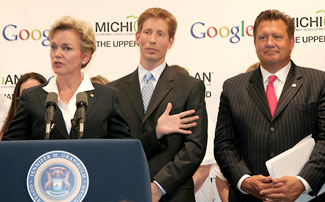UPPER MIDWEST REGIONAL REVIEW
Michigan's 'Soft Infrastructure'
Lures New Economy Stars
Lures New Economy Stars
Michigan's renewed commitment to hard infrastructure, as well as to soft infrastructure – such as educational institutions to turn out
 |
| Michigan Gov. Jennifer Granholm, along with James Epolito (right), president and CEO of Michigan Economic Development Corp., welcome Google co- founder and East Lansing native Larry Page back to Ann Arbor, where he earned a bachelor's degree in engineering from the University of Michigan in 1995. The new Google data center in the city will employ 1,000 within the next five years. |
Another example that the state's appeal has not gone unnoticed by corporate site selection teams: Google's recent blockbuster announcement that an Ann Arbor site won out over locations in Boston and Phoenix for a regional office of the firm's AdWords division. The company plans to draw engineering and technology talent from nearby University of Michigan and from Michigan State University down the road.
Such decisions are music to the ears of the state's beleaguered economic developers. "We are no longer the fly- over state," exclaims Jim Epolito, president and CEO of the Michigan Economic Development Corporation. "We are changing the paradigm of Michigan, with the help of the 21st Century Jobs Fund." While the incentives fund has not been without its detractors, there has been a noted uptick in interest – and inked deals – from new economy companies in search of skilled workers, strong infrastructure and an eager state that's ready to deal, he says. "There's no greater momentum for a state hungry for business than a steady stream of job losses. And our job losses are still much greater than our job gains," he says. Google is receiving a $38- million incentives package, with the condition that the firm remain committed to Michigan, and that it hire 2,000 workers.
Barge Traffic Keeps On Rolling
Increasingly, barges are carrying loads filled with non- farm products – heavy construction materials, chemicals and ore, according to data collected by the U.S. Army Corps of Engineers. "There is a greater percentage of non- agricultural goods transported on the Mississippi than ever before," notes Ron Fournier of the Corps' Rock Island division. And while overall barge traffic has decreased slightly in the past couple of years, Corps representatives believe that modernizing the lock system could entice manufacturing companies struggling with high fuel costs to look more seriously at barge transport, particularly if deliveries are not time sensitive, given the cost efficiencies.
The Corps has proposed $2.6 billion in new federal funding to enhance the locks system on the Upper Mississippi. If approved, the plan would finance construction of seven 1200- ft. (366- m.) locks to improve efficiency of barge traffic and to reduce congestion at ports. The larger locks would allow smoother passage of longer boats, which currently must break apart to pass through smaller locks. "Right now, barges have long waits to get through locks. This project would ease the congestion at the ports," says Fournier. The corps is recommending installation of the new locks in Quincy, Ill., and several ports further downriver in Missouri. The plan also includes lock extensions near Rock Island, New Boston, Gladstone, and Fulton, Ill., and Dubuque, Belleview and Muscatine, Iowa.
To encourage even greater use of Mississippi River transport, authorities in Southeast Iowa recently announced plans to construct a new port in the vicinity of Keokuk. Fort Madison, Lee County and Keokuk will participate in the Southeast Iowa Regional economic and Port Authority.
The move comes as Siemens is winding down its search for a wind turbine manufacturing facility, which will produce 150- ft. (46- m.), 11- ton fiberglass blades for the windmills. The availability of accessible inland river transport could boost Fort Madison's appeal. Already, the state has upped the stakes by voting to provide $1.5 million in incentives if Siemens chooses a site on U.S. Highway 61 – the 224,000- sq.- ft. (20,810- sq.- m.) former home of a Wabash factory.

